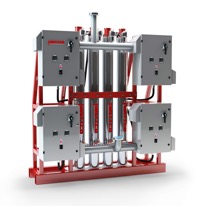Thermal Fluid Degradation: Causes and Prevention
Last updated on May 19th, 2025 at 05:52 am
Hot oil heating systems operate within a closed loop, with the heat transfer fluid recirculating through the heater elements. This method of heating makes circulation heaters extremely efficient and capable of accurate temperature maintenance.
Electric circulation heaters use a simple design that results in longer lifespans and easy maintenance. As such, if there is a decrease in performance, thermal fluid degradation is a likely culprit. As thermal fluid degrades, it can alter the flow, overwork the heating system, and cause damage.
In this article, we look at how to identify causes of heat degradation and how to prevent them before they become an issue.
Causes of Heat Transfer Fluid Degradation
Overheating
The most common cause of thermal fluid degradation is overheating. When the fluid is maintained at too high of a temperature a breaking, or cracking, of fluid molecules begins. As a result, the viscosity of the fluid decreases, and calcification can occur.
Without active maintenance, the resulting calcification can deteriorate the piping and heating equipment. As well, the decreased viscosity will affect the efficiency, quality, and reliability of your heating process.
Oxidation
When fluid and air come into contact at elevated temperatures oxidation occurs. When oxygen is introduced into a circulation heater, it is the perfect environment for this reaction to occur. The oxidation process results in poor thermal stability in the heat transfer fluid.
The poor thermal stability affects the viscosity of the fluid, creating sludge and buildups within the heating system. This decreases the flow rate, overtaxes the heater, and prevents efficient, reliable heating.
Prevention
Precision Heating
One of the key ways to avoid thermal fluid damage is by using systems that provide precision heating. Improving the accuracy of measuring, monitoring, and maintaining heat throughout the system serves to prevent overheating.
This accuracy is a major benefit of using electric circulation heaters. Using electricity allows for much greater precision and greater responsiveness. Customization of industrial heaters is also important to make sure the wattages, materials, and configurations are appropriate for each project.
Maintenance
Thermal fluid heater maintenance is one of the most important ways to preserve the integrity and efficiency of your heater and its heat transfer fluid. Proper maintenance not only helps to resolve and prevent degradation but also decreases the need for expensive repairs and increases heater longevity.
Routine maintenance may include inspections, cleaning, and hot oil flushing. These techniques serve to remove contaminants, prevent sludge and calcium buildups, and keep everything in good working order.
Valves, Connections, and Insulation
 During installation and maintenance, careful selection and inspection of all valves and connections are important. Check to ensure they fit properly, are not loosening, and provide no gaps for liquid or air. Reliable connections protect fluid integrity by reducing the risk of oxidation. As well, they help control movement to the expansion tank and reduce fluid loss.
During installation and maintenance, careful selection and inspection of all valves and connections are important. Check to ensure they fit properly, are not loosening, and provide no gaps for liquid or air. Reliable connections protect fluid integrity by reducing the risk of oxidation. As well, they help control movement to the expansion tank and reduce fluid loss.
Insulation also plays a valuable role in protecting thermal fluids. It is the most economical way to passively prevent heat loss. This helps keep temperatures in the system stable, while simultaneously decreasing the amount of energy the heater uses. As a result, the fluid integrity is protected and operational costs are lower.
Thermal Fluid Heaters
Wattco custom-manufactures electric circulation and thermal fluid heaters. Our team of engineers works with you and your budget to choose the ideal wattages, configurations, heater types, and materials for your specific project. This careful selection helps to ensure the integrity of your thermal fluid, increase the efficiency of your heater, and make your process more reliable.
Contact Wattco today for circulation heater quotes and information.
